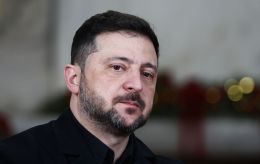Ukraine's Defense Intelligence head on Zapad-2025 drills says expect misinformation and panic
 The head of Ukraine’s Defense Intelligence, Kyrylo Budanov (photo: Vitalii Nosach, RBC-Ukraine)
The head of Ukraine’s Defense Intelligence, Kyrylo Budanov (photo: Vitalii Nosach, RBC-Ukraine)
The Head of Ukraine’s Main Intelligence Directorate, Kyrylo Budanov, warned that strong information pressure would begin from the very first days of the Russian-Belarusian exercises Zapad-2025. He noted that most of the disinformation would originate from Russia, according to Budanov’s statement at the forum Information Warfare: From Resistance to Resilience.
“These exercises, following the events of 2022 in Ukraine, now have clearly defined perceptual boundaries. They are increasingly seen not merely as drills, but potentially as something more than simple military maneuvers. And therein lies the problem,” he said.
According to the Head of the Main Intelligence Directorate, although there is currently a wave of information pressure, the onset of the active phase will trigger an intense surge of informational escalation from the very first days.
“Information injections will come from absolutely all directions: 90% from Russia, and 10%, unfortunately, from others. Hysteria will be deliberately amplified,” Budanov stated.
He also explained that, regarding the military and military-political component of these exercises, their purpose is to practice specific maneuvers outlined as actions in the western direction of the theater of operations.
“In other words, they will be simulating certain elements of a future war; this is not about Ukraine. The focus is primarily on symbols and signals directed at European countries - first and foremost, the Baltic states,” the Head of the Main Intelligence Directorate concluded.
Russian-Belarusian Zapad-2025 exercises
On August 12, the Belarusian Ministry of Defense announced that it would conduct joint military exercises with Russia under the name Zapad-2025. The active phase is scheduled to take place from September 12 to 16, with maneuvers planned on Belarusian territory and partially in Russia.
According to official statements, the purpose of the exercises is to test the capabilities of both countries in ensuring security and repelling potential aggression.
Initially, the Belarusian regime emphasized the exercises’ planned and regular nature, but recently it has increasingly justified them as a response to the so-called militarization of Poland and the Baltic states.
Lithuanian intelligence estimates the number of participants at around 30,000 servicemen, with roughly 8,000 stationed in Belarus, including only 2,000 Russian troops.
During the exercises, Lithuania has closed its airspace along the border with Belarus.
In Ukraine, the situation is primarily viewed as part of an information campaign rather than an immediate military threat, though the State Border Guard Service emphasizes that its units remain on heightened alert.
At the same time, Commander-in-Chief of the Armed Forces of Ukraine, Oleksandr Syrskyi, warned that under the cover of these exercises, there could be the covert formation of offensive military groups.
The Ministry of Foreign Affairs of Ukraine has already called on Minsk to avoid provocations and not move troops closer to Ukrainian borders during the Zapad-2025 maneuvers.

